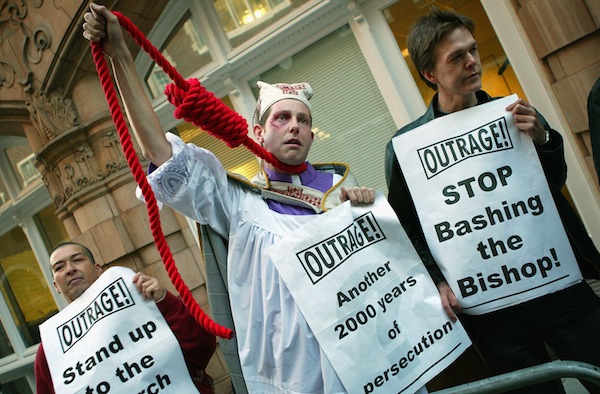This being the Ephiphany, churchgoing Anglicans will be on the receiving end of any variety of sermons on the visit by the three kings to the infant Christ. There won’t, by and large, then, be much attention given to the whole issue of gay bishops. No attention at all, probably.
You’d never think it, though, judging from the broadcast and press reaction to the news. On the Radio 4 Today programme yesterday, the presenter said sternly to one conservative Anglican, Norman Russell, the Archdeacon of Oxford, that the fuss over the issue of gay bishops just goes to show why people are turned off by the church: it can only ever think about sex. The archdeacon replied mildly that this wasn’t quite the case: the church did talk about other things.
Russell could have made a stronger case. He could have said, nope, it’s not the church that’s obsessed by sex; it’s journalists. The only reason why it feels like the church spends its time arguing about sex and gender is that these are the sole issues that are taken up in broadcast discussions about religion. Week after week, clergy treat congregations to reflections on justice, mercy, charity; much of the time in synod is taken up with the question of how best Anglicanism can serve the wider community; most of the time, Anglican clergy try to put these principles into effect on the ground. And what are the chances that any of this will be reflected in BBC coverage of religion? Quite. But give most papers, most pundits, a sniff of a row about gay clergy or women bishops and they’re off.
There was, of course, a real policy change here for critics of the CofE to get stuck into. The decision to allow gay clergy in civil partnerships to be ordained as bishops has stirred up all manner of divisions. The change has the merit of consistency. It’s difficult to see clerical orders as separable; in other words, if you are going to allow people in civil partnerships to be ordained as priests, then it makes sense for them to be eligible to be bishops. Same principle goes for women, in fact. But the same problem of credibility applies in both cases: is it likely that individuals who have entered into a civil partnership will abstain from sexual relations? It’s possible obviously, that the partnership may be emotional rather than sexual; it’s just unlikely to look that way. Clergy are meant to be individuals of exemplary lives, and in the Christian moral tradition, active homosexuality is understood to be at odds with the natural order (if you belong to the catholic tradition) or with scripture (if you’re evangelical).
What the row isn’t about is whether gay men can be bishops. If your homosexuality amounts to an attraction to your own sex which isn’t expressed in sexual relations, there isn’t a problem. Indeed there are any number of individuals in the CofE who would fall into the category, clergy and bishops. And there are notoriously lots of gay clergy who break the rules and have boyfriends – the tendency is all too obvious in the Anglo-Catholic tradition – without actually going so far as to enter a civil partnership to put the relationship on a public footing. It suits them that way. To repeat: homosexuality per se isn’t the problem, just homosexual acts. And yes, they’re separable.
But to return to the coverage of this question by broadcasters and journalists, perhaps the most irritating aspect is the tendency to lump the issue of women bishops and gay bishops together, presumably on the basis that both are issues on which you can generate controversy and pit so-called traditionalists against so-called liberals. And of course you can always get women activists such as Christina Rees, to oblige, by saying that action on the gay front brought the situation of women into greater prominence.
They are, however, different issues. Gay sex is a problem for Christianity and especially its ordained clergy; active homosexuality is condemned in scripture, and, in the Catholic tradition, it’s seen as a sexuality that doesn’t have any procreative possibilities and therefore at odds with natural law. So active homosexuality is a problem. For women, there’s no question of gender being sinful. It’s just an issue of whether women can fully represent Christ, who was male, in the ordained ministry, whether the scriptural prohibitions on women’s leadership in church are still valid, and whether, if women are ordained, there are sufficient protections for those who cannot accept their ministry. It’s not homosexuals and women, bacon and eggs; these are two different questions.
But politically, one of the most interesting aspects of this debate is whether the CofE was, as the BBC Religious Affairs editor, Robert Piggott suggests, influenced by the possibility that it could be breaking employment law by discriminating against those in civil partnerships in the running for bishoprics. In other words, equalities legislation may be having an effect on the running of churches, notwithstanding the protestations of legislators that they are broadly immune from its provisions. And if you think that’s an idle threat, reflect on the Catholic adoption agencies which, notwithstanding a very good record of placing problem children, were obliged to close as a result of discriminating in favour of married heterosexuals as parents. The reach of equalities law is long, and its effect on religious liberty malign.







Comments